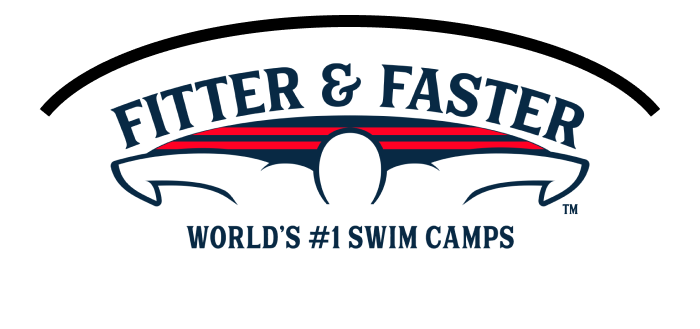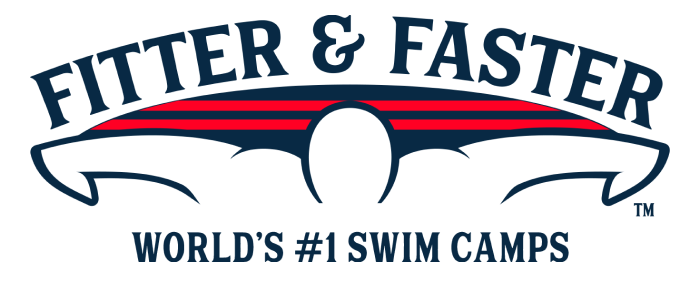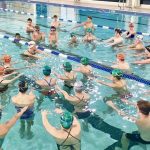Past Clinic: 2023 Livonia, NY Summer Swim Camp
Livonia High School
2 Bulldog Blvd,
Livonia,
NY 14487
A description of what was covered at this past clinic is below the upcoming clinics.
Upcoming Swim Clinics and Camps
Within 250 miles of Livonia, NY.
Past Clinic
Introduction
Fitter & Faster is producing a 2-day swim camp in Livonia, NY on August 17 & 18, 2023! This camp is for swimmers ages 12 and over who are interested in becoming more efficient and faster competitive swimmers.
SUMMER SWIM CAMP SERIES: Livonia, NY (Ages 12 & over)
DAY 1:
-> Session 1: The Fifth Stroke - Underwaters
-> Session 2: Explosive Starts
DAY 2:
-> Session 3: Fast Flip Turns, Open Turns & Finishes
-> Session 4: Essentials of Sprinting
Scroll down for details on the curriculum!
-> Availability in each session is limited to 24 participants to ensure the best learning experience!
-> SAVE when you purchase the “Full Camp Bundle” for your swimmer!
SESSION START TIMES:
Sessions 1 & 3: Check in 9 AM, Camp 9:15-11:45 AM
Session 2 & 4: Check in 12:30 PM, Camp 12:45-3:15 PM
Suggested Participants
Our top priority is to provide a world-class learning experience for all participants at all of our camps. This camp has sessions for swimmers ages 12 & older. Participants will range from one-year of competitive swimming experience to AAAA times and faster. If you are the parent of a child under the age of 12 and would like for your child to be considered for the younger sessions of this camp, please complete this questionnaire.
Curriculum
Session 1: THE FIFTH STROKE - UNDERWATER DOLPHIN KICKING
Why do elite swimmers have faster times in “short course” pools than in “long course” pools? It’s the power they’re able to generate from the walls, leading into the fastest sequence in every lap of a race: streamline -> underwater dolphin kick -> breakout!
- STREAMLINE: The streamline - if done properly - will be the fastest a swimmer travels while in the water. Proper streamlines are even faster than underwater dolphin kicking. Even the most elite swimmers in the world are constantly working on improving their streamline. Your swimmer will get tips to improve their streamline and a better appreciation of what they need to do on every single wall in practice and in races.
- INITIATING UNDERWATER DOLPHIN KICKING: Elite swimmers want to maximize their streamline on every single lap. So, they don’t want to start their underwater dolphin kicking while they’re still achieving maximum speed in their streamline. They also don’t want to start the underwater dolphin kicking after their streamline has begun to slow. Your swimmer is going to learn how to time when to begin their underwater dolphin kicking.
- POWERFUL UNDERWATER DOLPHIN KICKING: There are a few different techniques that swimmers use when underwater dolphin kicking. The common theme of these techniques is that the best swimmers kick up and down with equal power. We will show your swimmer the different techniques that elite swimmers use and teach them how to implement.
- NUMBER OF UNDERWATER DOLPHIN KICKS: Figuring out the optimal number of kicks off each wall, for each race, is essential to fast swimming. Elite swimmers want to spend only the absolute necessary amount of time underwater to establish speed with each length. They want to avoid losing their breath and taking weak kicks.
- BREAKOUTS: Many swimmers add movement within their breakout that creates drag and destroys all of the speed created during their underwaters. Participants will work on timing their breakouts to explode into each lap.
Session 2: EXPLOSIVE STARTS
The better a swimmer’s technique is off the starting block, the more speed they will carry into the water. Session 2 of this swim camp will help your swimmer improve their start, underwater dolphin kicking and breakouts!
- BLOCK STARTS: To ensure an explosive start, a swimmer needs to set themselves up properly on the block. The elite clinicians will work with participants on the optimal positioning of your swimmer’s entire body to allow for a quick reaction time and optimal speed.
- BACKSTROKE STARTS & WATER ENTRY: Your swimmer is going to learn and practice starting a high performance backstroke race. We’re going to work on a “clean”, fast water entry in which the athlete carries the momentum from the start into their streamline, underwater dolphin kicking and breakout.
- RELAY EXCHANGES: In relays, reaction time is crucial! At this camp your swimmer will learn skills that the best swimmers in the world use to time the “exchange” just right! If we react too quickly, we’ll start before the other swimmer finishes - and we’ll get disqualified. If we start too slow, we can lose our positioning in a race! Learning the proper technique for a well-timed start and an explosive relay dive will make your swimmer a valuable teammate.
- FINISHES: Races are won and lost by hundredths-of-a-second at every swim meet. Many races come down to the last few strokes. At this camp, your swimmer will learn techniques to set themselves up for a well-timed finish about 10 yards from the wall. A well-timed finish is also a valuable attribute for swimmers competing on relays so that the next person can time their start with precision.
Session 3: FASTER FLIP TURNS, OPEN TURNS & FINISHES
Quick, powerful turns and finishes are crucial to fast times and winning close races. The top age group and elite swimmers aren't using walls just for turning around - they are used to generate speed and momentum going into the next lap. Elite swimmers are constantly working their turns and looking for areas to improve them. During Session 3, we're going to work with your swimmer on taking this crucial part of every race (and practice) to the next level!
- MOMENTUM: At the elite level of swimming, walls aren’t just used for turning around - they are used to generate speed and momentum going into the next lap. Outside of the elite ranks, most swimmers stop or slow down while going into the wall, which kills their momentum! We will work with participants on the intricacies of approaching every wall at top speed and seamlessly initiating their “turn”.
- FLIP TURNS: Flip turns are an opportunity for your swimmers to increase momentum in the middle of a race! Flip turns in which the athletes slow down or have “mechanical” movements negatively impact the speed at which a swimmer comes off the wall. We will work with your swimmer to produce fast flip turns so that they can explode off the walls at maximum speed.
- OPEN TURNS: Elite butterflyers and breaststrokers utilize speed from their last lap to create momentum and even more speed at the beginning of the next lap. Their open turns are actually not “turns”, but more like high-speed pivots. Participants in this session will work on these techniques to have much faster open turns!
- FINISHES: Setting yourself up for a fast finish is very similar to setting yourself up for a strong turn in any race. Races are won and lost by hundredths-of-a-second at every swim meet. Many races come down to the last few strokes. At this camp, your swimmer will learn techniques to set themselves up for a well-timed finish when they are still about 10 yards from the wall.
Session 4: ESSENTIALS OF SPRINTING
Now is the time for young swimmers to establish and cultivate habits to swim their shorter races as fast as possible with good technique that will position them for success as they mature.
- BODY POSITION: A competitive swimmer’s body position is the key to fast swimming. Most swimmers are NOT hydrodynamic in the water - and that has a big effect on how fast they “allow” themselves to swim - especially as they get older. Let’s find the right body position for your swimmer.
- LENGTH OF STROKE: Lengthening their stroke will enable your swimmer to “catch” and hold onto more water to propel them as they swim. Whereas a short stroke is inefficient and not sustainable for very long. The clinicians will work with participants on this important skill for fast swimming.
- TEMPO: When sprinting short races young swimmers often tend to take too many strokes (“spin their wheels”) and not “hold onto the water”. At this camp we will find the appropriate tempo to maximize their own personal speed.
- BREAKOUTS: Many swimmers add movement within their breakout that creates drag and destroys all of the power created during their underwaters. Participants will work on timing their breakouts to accelerate to explode into each lap.
- SPRINTING: On Day 1 your swimmer worked on body position, tempo and length of stroke. Today we are going to apply those skills to swimming “all out” on top of the water with efficiency and power.
- WALLS: Approaching the wall at top speed in preparation for the fastest turn is vital. Swimmers will work on techniques to get in and out of every wall faster!
- FINISHES: Dropping time and even winning or moving up a few spots in the results can all come down to the last stroke! A well-timed finish at full speed, with full-arm extension and head down can make a difference of up to a full second in a race! Your swimmer is going to learn how to take advantage of the finish to drop time!
- SPRINTING APPLICATION: Swimmers at this session will work on applying their newly developed skills during racing scenarios. As with all the other segments of this camp, the clinicians will provide feedback for your swimmer to take home and apply at upcoming practices and meets.
ASK QUESTIONS
Swimmers and parents are invited to ask the clinicians questions during a Q&A session. Gain insight into their training regimen, diet and nutrition, and recovery tactics.
WATCH THE CLINICIANS
Observe clinicians swim at full speed and demonstrate a progression of perfectly executed drills to achieve powerful, efficient and fast swimming.
PUT YOUR SKILLS TO THE TEST
Swimmers will get to practice what they've learned by taking their stroke to your top speed with some of the best swimmers and coaches in the world! They'll work on holding onto their form while challenging themselves.
Take a photo, get autographs, and chat with your clinicians!
Inquisitive, Educated Swimmers are Faster Swimmers! Sign up today!
Search all of our clinics...or request a clinic in your area









